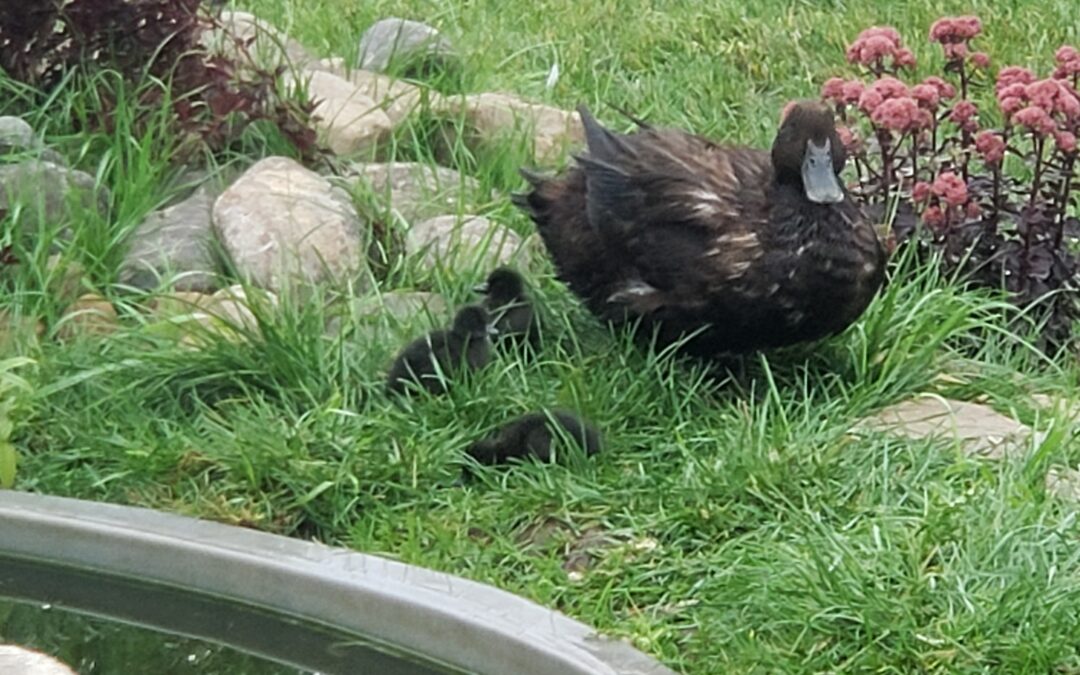Sometimes we have to learn lessons the hard way on our homesteads. Recently, we decided to let our duck (named Goose, a Cayuga) hatch her own babies naturally. Unfortunately, she hatched them in the most brutal rainstorm we have had in well over a year. Plus, the hawks were all too ready and hungry, and most of the ducklings didn’t make it. But we learned what to do and what not to do – the hard way.
I am writing this not only to help those who recently adopted chickens or ducks and intend to let them hatch chicks, but it’ll help any homesteader grappling with the loss of an animal, especially when predators are about. And that’s why I do what I do and continue to write about it and make videos about the lessons we can learn from having our own homesteads.
The first piece of advice I have if you choose to let a duck or chicken hatch eggs naturally, is to simply understand there will be a fatality rate. Not all of the babies will make it to egg laying or adulthood. In fact, if this is your first time, most won’t make it past ten days. This one was hard for me. I really love life and dislike the prospect of having to lose a little baby for any reason. But because of that, I’ve learned how to cope emotionally and prevent some loss in the future. (Watch for our article on how to build a scarecrow to keep hawks away from chicks or ducklings.)
But, hatching ducklings naturally, other than the loss rate, is fairly easy because the mother duck does most of the work.
Once our Cayuga ducklings hatched, we weren’t sure what to do. I went back and forth with myself on the best way to make sure they survived. In the end, this was our first time experiencing this, and we didn’t know we’d lose so many. It’s hard to cope with the loss of losing a duckling, especially when this is the first experience of hatching, but we learned valuable lessons. Nature is rough. It can be brutal. Hawks don’t care about how cute those peeping birds can be.
But, what we did learn is that we need a system to prevent hawks from taking our little babies. After tons of research, and understanding that another dog or alpaca was not the right option for us, we decided on a scarecrow. I noticed that hawks retreat when I go outside, perceiving me as a predator. So I decided to make a scarecrow. Will it work? I don’t know. Am I determined to try? You bet! Watch for an article on how I do it and if it works!
There is nothing like the sadness of losing a duckling you watch be hatched and pulled out of the egg by its mother. So if building a scarecrow is what it takes to save even one, we can try it. Losing the ducklings only made me more confident that I can save more in the future and help give them homes. We don’t use our ducks for meat, and that’s a personal choice, but if others can grasp homesteading by buying a baby duck from us, then I feel like I’ve helped, even if they choose to eat it.
We will hatch more babies, but we may not do it all naturally. Ducks are incredible and intelligent creatures and I know we can do them justice. There’s a reason the universe directed us toward them as opposed to chickens and I am determined to be the best duck homesteader I can be! That could mean we try incubating eggs in the near future instead of allowing a mama duck to hatch her babies alone in a field during a torrential downpour.
We don’t consider the loss of the ducklings a burden anymore, although, initially, it was an emotional roller coaster. It has only hardened our resolve to do the right thing by the animals we choose to own and care for, and this enhanced care is going to be extended to our ducks, dogs, bees, and cats. (In fact, I am injecting a cat to treat FIP, a formerly fatal disease.)
The lessons of homesteading can carry over into many parts of our lives, and in order to be the best humans we can be, the best advice I have, (as I avoid giving advice) is that we learn, grow, make mistakes, feel the ramifications of those mistakes, understand the guilt, and move on in order to do better. How else will we grow as human beings? How else can we learn? And in the end, the universe will judge us by our intentions and actions, not by how many ducklings were eaten by hawks.
Read more of our homesteading adventures:
Ducks vs. Chickens & How We Chose
How To Maximize Duck Egg Production From Your Flock
How to Improvise Your Ducks’ Watering and Make a DIY Pool
Bumblefoot: What Is It & How You Can Help Your Bird
How to Prepare Your Flock of Ducks For Winter
This article was originally published at Ready Nutrition™ on September 24th, 2021







